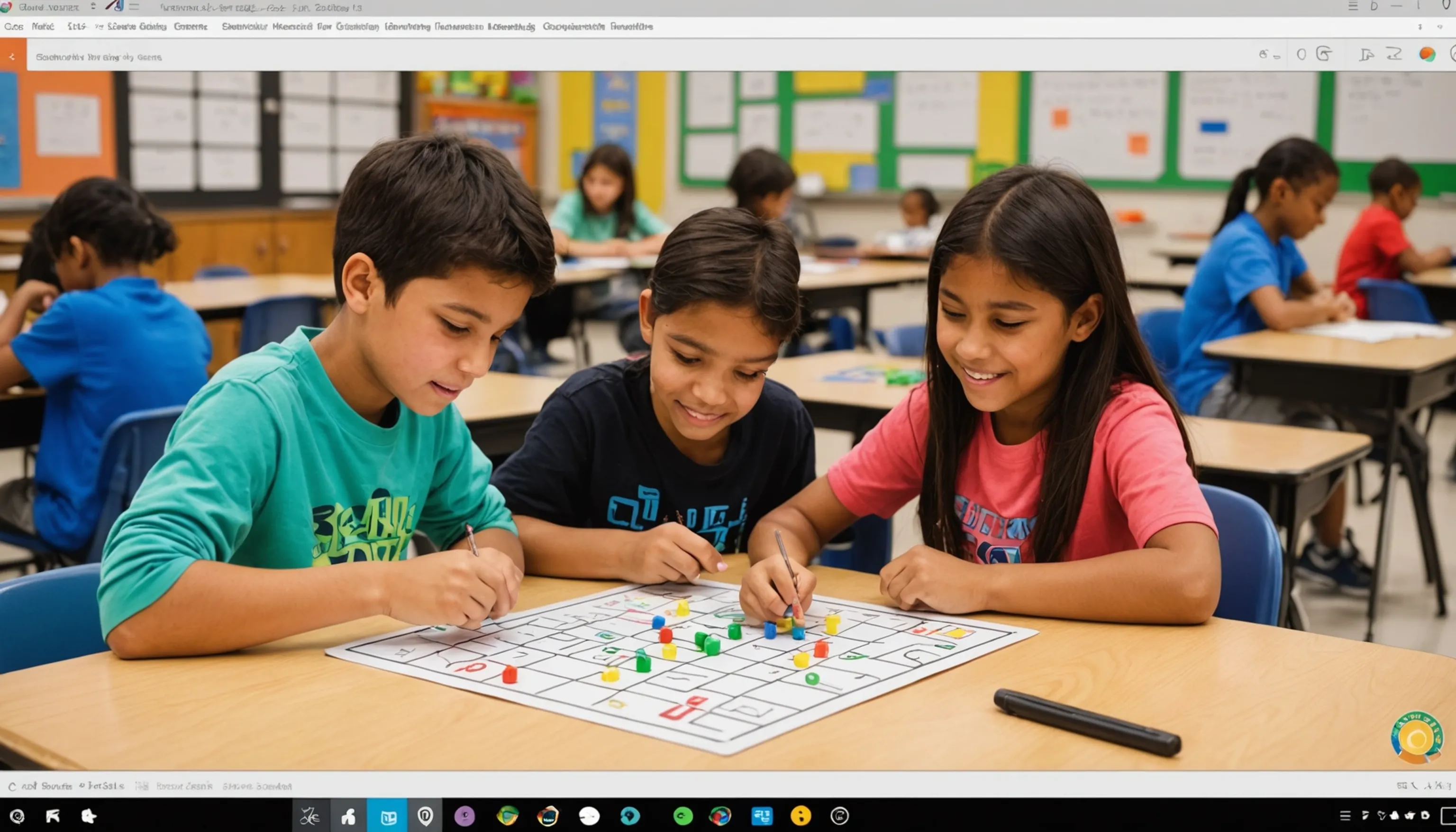Free Math Games for 5th Grade
 HvWHenry van Wagenberg
HvWHenry van Wagenberg
Best Free Math Games for 5th Graders
Finding the best free math games for 5th graders can make learning fun while reinforcing important concepts. Websites like Kahoot!, Prodigy, and Coolmath Games offer a variety of engaging activities tailored to this age group. These games cover essential topics such as fractions, decimals, and geometry through interactive challenges.
Additionally, platforms like IXL and Math Playground provide a mix of problem-solving games and practice exercises, ensuring that students not only enjoy their learning experience but also enhance their skills effectively.
Interactive Online Math Games
Interactive online math games have transformed the way 5th graders engage with mathematics. These games are designed to be educational while providing an entertaining experience. Platforms like ABCya and Math Games offer a variety of interactive activities that cover essential math skills including multiplication, division, and word problems.
One of the key benefits of these games is that they cater to different learning styles. Visual learners can benefit from games with graphics and animations, while auditory learners can engage with games that include audio instructions. Furthermore, many games adapt to the player's skill level, ensuring that students are neither bored with material that's too easy nor overwhelmed with challenges that are too difficult.
Games like Sumdog and Prodigy Math incorporate elements of competition and rewards, motivating students to improve their skills. They can earn points or badges as they progress, which encourages persistence and a growth mindset. Interactive games also often include immediate feedback, allowing students to learn from their mistakes in real-time.
Incorporating these games into the learning process can lead to improved math scores and a more positive attitude toward the subject. They can easily be integrated into daily lessons or used as a fun supplement for homework. Overall, interactive online math games serve as a valuable resource for both teachers and parents looking to enhance their children's math skills.

Math Apps for 5th Graders
With the rise of technology in education, math apps for 5th graders have become essential tools for enhancing mathematical understanding. These applications are designed to make learning math both accessible and enjoyable. Popular apps like Mathway and DragonBox provide interactive lessons that cover a wide range of topics including algebra, geometry, and fractions.
One significant advantage of using math apps is their ability to offer personalized learning experiences. Many apps adapt to each student's skill level, providing challenges that are tailored to their current understanding. For instance, Prodigy Math allows students to engage in a fantasy world while solving math problems, making learning feel more like a game than a chore.
Additionally, these apps often include features such as progress tracking and performance analytics, which help parents and teachers monitor a child's improvement over time. This data can guide future learning strategies and help identify areas where a student may need additional support.
Another compelling aspect of math apps is their availability. Many are free or low-cost, making them accessible to a wide range of families. They can be used at home or on the go, providing flexibility in learning. Whether it's through engaging quizzes, interactive lessons, or problem-solving games, math apps offer valuable resources that can significantly enhance 5th graders' math skills and confidence in the subject.
Benefits of Math Games for Learning
The benefits of math games for learning are numerous, especially for 5th graders. These games make learning engaging and enjoyable, which can boost students' motivation and interest in mathematics. By incorporating elements of fun, such as competition and rewards, math games encourage students to practice skills without feeling pressured.
Furthermore, they enhance critical thinking and problem-solving abilities, helping students develop a deeper understanding of mathematical concepts. Many math games also provide immediate feedback, allowing learners to recognize and correct their mistakes in real-time. Overall, math games serve as an effective tool for reinforcing learning and improving academic performance.

Enhancing Problem-Solving Skills
Enhancing problem-solving skills is one of the most significant benefits of incorporating math games into learning for 5th graders. These games challenge students to think critically and approach problems from various angles. For instance, games that require strategic thinking, like Math Blaster or Math Jeopardy, encourage players to analyze situations, make decisions, and adapt their strategies based on the outcomes.
As students navigate through different levels and challenges, they learn to break down complex problems into manageable parts. This skill is crucial not only in mathematics but also in everyday life. The more they practice, the more proficient they become at identifying patterns, recognizing relationships, and applying logical reasoning to solve problems.
Moreover, many math games simulate real-life scenarios, allowing students to see the practical application of their math skills. For example, games that involve budgeting or resource management provide context for mathematical concepts, helping students understand their relevance and importance. This real-world application fosters a deeper understanding and retention of material.
Additionally, collaboration is often a key feature of math games. Working with peers to solve problems promotes communication and teamwork, further enhancing their problem-solving skills. By discussing strategies and sharing insights, students learn to view problems from multiple perspectives. In conclusion, math games are an invaluable resource for enhancing problem-solving skills, equipping 5th graders with the tools they need for academic success and beyond.
Making Math Fun and Engaging
Making math fun and engaging is essential for fostering a positive attitude toward learning in 5th graders. Traditional methods of teaching math can sometimes lead to disinterest or anxiety among students. However, incorporating games into the curriculum transforms the learning experience into an exciting adventure. For instance, platforms like Coolmath Games and Prodigy offer interactive math challenges that captivate students’ attention.
These games often feature vibrant graphics, storylines, and rewards systems that keep students motivated. By presenting math concepts in a playful manner, students are more likely to engage deeply with the material. For example, a game that requires students to solve math problems to advance in a storyline can make learning feel less like a chore and more like a quest.
Moreover, math games foster a sense of competition, whether against oneself or peers. This competitive spirit can drive students to improve their skills and strive for higher scores. With features like leaderboards and badges, learners are encouraged to practice more and challenge themselves.
Additionally, integrating movement into math games can further enhance engagement. Games that require physical activity, such as math scavenger hunts, combine learning with movement, making the process even more enjoyable. Overall, by making math fun and engaging, educators and parents can inspire a lifelong love for mathematics in 5th graders, transforming their approach to learning from one of apprehension to one of excitement.
How to Incorporate Games in Math Learning
Incorporating games in math learning can significantly enhance student engagement and understanding. Start by selecting appropriate math games that align with the curriculum, such as digital platforms like Prodigy or board games that focus on math skills.
Set aside specific times during the week for game-based learning, allowing students to explore different concepts in a fun way. Encourage collaboration by having students work in pairs or small groups to solve problems together. Lastly, use games as a reward for completing lessons, reinforcing learning while keeping the atmosphere enjoyable and motivating.
Setting Up a Math Game Night
Setting up a math game night is a fantastic way to make learning enjoyable for 5th graders while fostering a love for mathematics. To begin, choose a suitable date and time that works for all participants, ensuring that parents or guardians are informed and involved. Next, select a variety of math games that cater to different skill levels and interests. Include both digital games, like Prodigy and Coolmath Games, and traditional board games such as Sum Swamp or Math Dice.
Arrange the gaming space to create a welcoming environment. Set up different stations for each game, making it easy for students to rotate between them. Provide snacks and refreshments to keep the energy high and create a relaxed atmosphere. Ensure that each game station has clear instructions, so participants can understand the rules without needing constant supervision.
Encourage teamwork and collaboration by forming small groups or pairs. This not only promotes social interaction but also allows students to share strategies and learn from one another. To add a competitive element, consider organizing a tournament with small prizes for the winners, which can motivate participants to engage more deeply with the games.
Finally, gather feedback after the event. Ask students which games they enjoyed the most and why. This can help you plan future game nights and refine the selection of games based on their interests. Overall, a math game night can transform math learning into a fun, community-building experience.
Using Games for Homework Help
Using games for homework help can make the learning process more enjoyable and effective for 5th graders. By incorporating engaging activities into homework routines, students are more likely to stay motivated and retain information. Here are some strategies to effectively use games for homework support:
- Choose Relevant Games: Select games that align with the homework topics. For instance, if students are working on fractions, games like Fraction Frenzy can reinforce these concepts while providing practice.
- Set Goals: Encourage students to set specific goals for their game sessions. For example, they could aim to complete a certain number of levels or solve a set number of problems correctly.
- Incorporate Variety: Use a mix of digital and board games to keep things fresh. Apps like Kahoot! and Quizlet can be combined with physical games like Math Bingo for a diverse experience.
- Collaborate with Peers: Encourage students to play games with friends or family members. This collaborative approach not only makes learning social but also allows for discussion and explanation of concepts.
- Track Progress: Help students keep track of their progress and achievements in games. This can motivate them to continue improving and mastering math skills.
By integrating games into homework routines, parents and teachers can create a more dynamic and enjoyable learning experience. This approach not only reinforces math concepts but also fosters a positive attitude toward learning.
